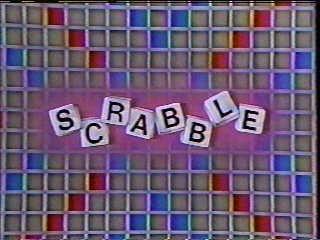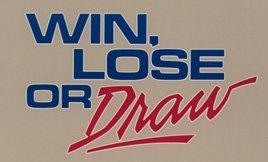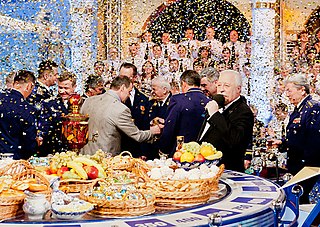Related Research Articles

Scrabble is an American television game show based upon the Scrabble board game. Muriel Green of Exposure Unlimited developed the idea for a television game show based upon the board game concept. During 1983, Green convinced Selchow and Righter, who at that time owned the Scrabble board game, to license Exposure Unlimited to produce the game show. Exposure Unlimited co-produced the show with Reg Grundy Productions, and licensed the show to NBC. Scrabble aired on NBC from July 2, 1984, to March 23, 1990, and again from January 18 to June 11, 1993. Chuck Woolery hosted the program. Jay Stewart was the announcer for the first year. Charlie Tuna replaced him in the summer of 1985 and remained through the original run and the entirety of the 1993 revival.

Lingo is an American television game show with multiple international adaptations. In it, contestants compete to decode five-letter words given the first letter, similarly to Jotto, with each correctly guessed word earning number draws to attempt filling in a Bingo card.

Win, Lose or Draw is an American television game show that aired from 1987 to 1990 in syndication and on NBC. It was taped at CBS Television City, often in Studios 31, 33, and 43 at various times. It was co-produced by Burt & Bert Productions and Kline & Friends for Disney's Buena Vista Television. It has also had two versions on The Disney Channel: Teen Win, Lose or Draw from 1989 to 1992, and a revived version known as Disney's Win, Lose or Draw which aired in 2014. New York described Win, Lose or Draw as "a knockoff" of the board game Pictionary.

Chain Reaction is an American television game show created by Bob Stewart, in which players compete to form chains composed of two-word phrases.

The Cross-Wits is an American syndicated game show which premiered on December 15, 1975, and lasted for five seasons until its cancellation on September 12, 1980. The show was hosted by Jack Clark, with Jerri Fiala as hostess. Announcing duties were handled by John Harlan, Jay Stewart, and Jerry Bishop. The show was produced by Ralph Edwards Productions and distributed by Metromedia Producers Corporation.
Definition is a Canadian television game show, which aired on CTV from September 9, 1974 to March 10, 1989, and filmed at its flagship studios of CFTO-TV at 9 Channel Nine Court in Scarborough, Toronto, Ontario. For most of its run, it was hosted by Jim Perry.
Double Talk is an American game show that aired on the ABC network from August 18 to December 19, 1986. The show was a Bob Stewart-produced word game which borrowed elements from Stewart's previous show Shoot for the Stars and his then-current editions of Pyramid.

Think Fast is an American children's game show which aired on Nickelodeon from May 1, 1989, to March 30, 1990, with reruns airing weekly until June 29, 1991.

The $1,000,000 Chance of a Lifetime is an American game show which offered a $1 million (annuitized) grand prize to winning contestants. The show aired in syndication from January 6, 1986, until May 22, 1987. The show was hosted by Jim Lange, and he was joined by Karen Thomas as co-host during the second season. Mark Summers was the show's announcer for the first few weeks and Johnny Gilbert announced the remainder of the series. The show was produced by XPTLA, Inc., and distributed by Lorimar-Telepictures.

Body Language is an American game show produced by Mark Goodson Productions. The show aired on CBS from June 4, 1984, until January 3, 1986, and was hosted by Tom Kennedy. Johnny Olson announced until his death in October 1985; Gene Wood and Bob Hilton shared the announcing duties afterward, and had substituted on occasion before that.

Blackout is an American game show that was broadcast on CBS as part of its daytime schedule from January 4, 1988 until April 1, 1988. The program was created and produced by Jay Wolpert. The game features two contestants, each paired with a celebrity. Contestants attempt to solve word puzzles consisting of a sentence or short paragraph with four blank spaces. Players guess each missing word based on hearing clues recorded by their partner, but with the playback being muted or "blacked out" at certain places by their opponent.

All-Star Blitz is an American game show that aired on ABC from April 8 to December 20, 1985, with reruns airing on the USA Network from March 31 to December 26, 1986. Peter Marshall was the host and John Harlan was the announcer for the series, which was produced by Merrill Heatter Productions, in association with Peter Marshall Enterprises.

Pole Chudes is a Russian adaptation of the U.S. game show Wheel of Fortune produced by VID, provided with elements of Russian culture and hosted by Leonid Yakubovich. The current rating of the show suggests it is intended for ages 16 and above, unlike the American version which is suitable for all age groups. Channel One Russia currently intends to stop buying Pole Chudes from VID and replace it with a licensed version of Wheel of Fortune under the same name since January 2022. Originally, due to a trademark dispute with VID, the title of the new show was supposed to be Nashe Pole Chudes, however, VID later agreed to let Channel One keep the original Pole Chudes name and the full 31-year archive, while Channel One will be producing the new reboot of the show as a licensed spin-off of Wheel of Fortune.
PDQ and Baffle are American television game shows created by Heatter-Quigley Productions. Both shows' objective was for contestant/celebrity teams to guess a given word or phrase in the shortest amount of time with the fewest letters given as possible.

Password Plus and Super Password are American TV game shows that aired separately between 1979 and 1989. Both shows were revivals of Password, which originally ran from 1961 to 1975 in various incarnations. With only subtle differences between them, both Password Plus and Super Password retained the format of play as their predecessor, with two teams of two people each—a celebrity and a contestant—attempting to guess a mystery word using only one-word clues. A new feature included a series of five passwords as clues to an overarching puzzle for the teams to solve.

Stumpers! is a game show hosted by Allen Ludden that aired on NBC from October 4 to December 31, 1976. Lin Bolen, former head of NBC Daytime Programming, developed the show. Bill Armstrong was the program's regular announcer, with Charlie O'Donnell filling in for several episodes. The show featured game play similar to Password, with two teams attempting to guess the subject of puzzles based on clues provided by their opponents.
Lingo is a British game show based on the American programme of the same name, the original iteration of the programme was made by Thames Television and Action Time for ITV, running for a single series with host Martin Daniels from 12 May to 14 July 1988.
Family Game Night was an American television game show based on Hasbro's family of board games and EA's video game franchise of the same name. The show was hosted by Todd Newton. Burton Richardson was the announcer for the first two seasons; he was replaced by Stacey J. Aswad in the third season, and Andrew Kishino was hired for the fourth season. The 60-minute program debuted on October 10, 2010, on The Hub which was Discovery Kids. The network became Discovery Family on October 13, 2014; it was previewed on October 9, 2010, on its sister channel, TLC. Seasons 1 and 2 each contained 26(1) and 30(2) episodes. Seasons 3, 4 and 5 each contained 15 episodes. Season 2 premiered on Friday, September 2, 2011, with additional games being added. The games added to the second season included Cranium Brain Breaks, Green Scream, Ratuki Go-Round, Simon Flash, Operation Sam Dunk, Trouble Pop Quiz, and Spelling Bee. However games from the previous season were still kept.

Ellen's Game of Games, also known as Game of Games and stylized as ellen's GAME OF GAMES, is an American television game show that aired on NBC. In March 2017, NBC ordered six hour-long episodes of the series. Ellen DeGeneres serves as host, while Stephen "tWitch" Boss appears as announcer/sidekick. The series is based on game segments from DeGeneres' daytime talk show, The Ellen DeGeneres Show. The series premiered on December 18, 2017. On February 18, 2020, DeGeneres announced on The Ellen DeGeneres Show that the series was renewed for a fourth season, which began airing on October 6, 2020. In January 2022, the series was canceled after four seasons.

People Puzzler is an American television game show hosted by Leah Remini and broadcast by Game Show Network. It premiered on January 18, 2021.
References
- ↑ TV Guide Guide to TV . Barnes and Noble. 2004. pp. 357. ISBN 0-7607-5634-1.